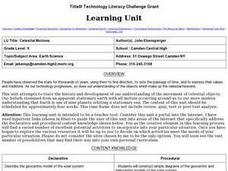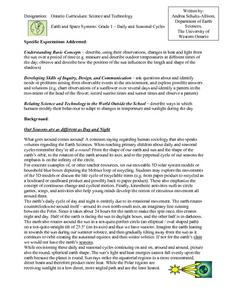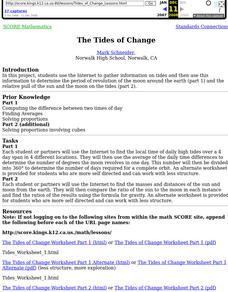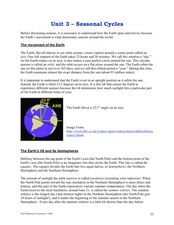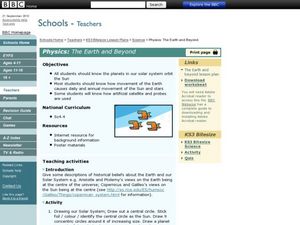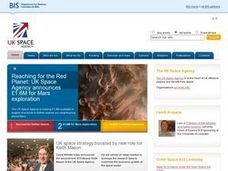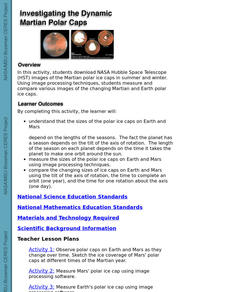University of Arizona
The Exotic Vacation
Students explain the concepts and vocabulary of Earth's rotation. They plan imaginary vacations based on the seasons in different locations. This is a very creative lesson plan, which students enjoy.
Curated OER
Planet Earth
In this Earth learning exercise, students review the characteristics of the Earth including it's rotation and revolution. This learning exercise has 9 fill in the blank and 7 short answer questions.
Curated OER
Celestial Motions
Ninth graders complete a unit of lessons on the history of our knowledge of celestial objects. They conduct Internet research, plot the motion of a planet, construct a model of the sun's apparent motions, and create diagrams of the solar...
Columbus City Schools
Experiencing Eclipses
Don't be caught in the dark! Young scientists investigate the causes of both solar and lunar eclipses using an interactive to help them understand the development of an eclipse over time. They then research facts and characteristics...
Curated OER
Science: Daily and Seasonal Cycles
First graders use their observations to describe daily and seasonal cycles. through a demonstration using a suspended ball and flashlight, they determine the time of day in various locations. Next, 1st graders participate in a...
Curated OER
Tides of Change
Students use the Internet to gather information on tides and then use this information to determine the period of revolution of the moon around the earth (part 1) and the relative pull of the sun and the moon on the tides (part 2).
Curated OER
Seasonal cycles
Students understand that the rotation of the Earth is responsible for the seasons. In this seasonal cycles lesson, students learn how the rotation of the Earth affects the seasons. Students answer questions about the rotation, the...
Curated OER
Worksheet 19: Ship Positions
In this math worksheet, students read informational paragraphs and then answer 18 questions using data from their readings. Questions are about vectors, positions, distance and orbits.
Curated OER
Taking the Measure of the Universe
Four fabulous activities immerse amateur astronomers into measuring objects that we cannot handle. The experiences are applied to NASA's Space Interferometry Mission, which will take measurements of planets around stars other than our...
Curated OER
Physics The Earth and Beyond
Fourth graders will explore our solar system. In this physics lesson students create a model of the solar system to explore the movement of Earth, the Sun, and stars.
Curated OER
The Analemma
Learners describe the relationship between the tilt of Earth's axis and its yearly orbit around the sun, by learning about analemmas. They determine what they can do to show that the sun's position doesn't change, and they find ways to...
Curated OER
Discovering a Law of Space Physics
Students use data collected by an astronomer to determine the relationship between the time it takes the planet to orbit the sun and the average radius of the planet's orbit around the sun. Students use trial and error to find the...
Curated OER
Cryosat Mission
Beginning with general information on satellites and seasons, concluding with polar ice and the Cryosat Mission, this worksheet gives your earth scientists an opportunity to conduct some research. Most of the assignment consists of short...
Curated OER
Toilet Plunger Sundial
Students build a sundial to measure the local noon time. In this third grade science lesson, students build a sundial out of common materials and align to measure the local noon. This lesson is a hands-on tracking of the sun, and allows...
Curated OER
Space Science
Eighth graders study the objects in our solar system. In this space lesson students identify and describe planets, then classify them as terrestrial or gaseous.
Curated OER
Phases of the Moon
Sixth graders learn that the moon orbits the Earth in a predictable cycle. Each learner engages in a two-week observation of the moon. They sketch its appearance, and take note of its position in relation to objects in their yard. Some...
Curated OER
The Solar System and Beyond
What an inspiring PowerPoint! The color scheme and pictures all contribute to the scientific style of this PowerPoint and will keep the attention of your junior high kids. The diagrams help illustrate the positioning of the moon, sun and...
Star Date
Modeling the Night Sky
Dramatize the stars and planets as they become a visual representation of the solar system in this activity. Young astronomers track and simulate various constellations as they orbit the Earth to learn the position and motion of...
Curated OER
As the World Turns
Students will use their bodies to act out the motions of Earth by exploring orbits, rotations, and the turning of the earth as it revolves around the sun. Doing research to find correct answers to their questions will help them act out...
Curated OER
Universal Gravity and Kelper's Laws Worksheet
High school physicists apply their knowledge of planetary motion. Using Kepler's three laws, Newton's law of universal gravitation, and the provided properties of the moon, sun, and Earth, they proceed to solve 23 problems. An...
Curated OER
Investigating the Dynamic Martian Polar Caps
Students download NASA Hubble Space Telescope images of the Martian polar ice caps in summer and winter, and measure and compare various images of the changing Martian and Earth polar ice caps.
Curated OER
Meteors
Students identify the different types of meteorite using an interactive website. In this earth science lesson, students simulate how meteors crash on a surface. They relate meteor size to crater size.
Curated OER
Bouncing Sunlight
Third graders use flashlights and balls to demonstrate how the light bounces off of the sun and reflects onto the moon. They record their observations in a journal.
Curated OER
Phases of the Moon
For this moon phases worksheet, students learn about the different phases that the moon goes through. They then use the information the learned to answer the 9 questions in the packet. The answers are on the last page.




